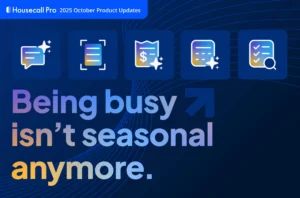Want to win more jobs with less effort?
Grow your business and send quick quotes with our home service software.

Want to see your potential revenue?
See what businesses like yours earn with Housecall Pro in 1 - 2 minutes.

Understanding the difference between key terms like estimates, proposals, and quotes is vital to winning new clients and projects. To be a successful home service business owner, you need to accurately present the pricing and scope of your services to establish trust and maintain your reputation.
If you’re a home service business owner, it can be hard to know the difference between them, especially when you’re looking for the best method to win and book a job.
For instance, estimates can be fixed in pricing and function as a quote, which means the cost of your job is roughly calculated but not as negotiable as, say, a proposal that offers flexible options for end customers (typically presented in good, better, best formats). Estimates for the prices of jobs can also be subject to change. Clear as mud, right?
Let’s discuss the differences and similarities between these terms and some best practices for each to help you stand out from the competition and close more deals.
What is an estimate?
An estimate is a rough calculation of the cost of a project. Estimates are made when potential customers want to know more about your services. Estimates help them assess their budget and understand their financial commitment.
Estimates typically aren’t binding to your clients, meaning the project’s final cost could be higher or lower than the initial estimate. Estimates priced with flat rate models are typically fixed in price. However, estimates priced with time and materials are subject to change with the final job invoice.
It’s important to note that when you’re estimating, you want to walk a fine line between maintaining profitability and giving the customer a good price.
Job costing lets you track and report on costs for every job and look at expenses and profits all in one place. Housecall Pro’s job costing features make it easy to measure expected vs. actual costs and ensure profitability regardless of if you price flat rate or with time and material.
Here are some other factors that can affect an estimate:
Time tracking
Time spent on a job can directly affect a job’s estimate. That’s why with job costing, you can use time tracking features to understand costs and keep up with the time spent on jobs. This helps make sure your estimate is accurate depending on how long techs have spent on a job.
Rate tracking (fully loaded rates)
Loaded rates are calculated by multiplying by the time spent on a job. The actual formula for time tracking includes an employee base rate plus costs associated with taxes. With job costing, you can track overall revenue and profits when an estimate is made, making it invaluable for tracking job costs.
If you’re creating an estimate with time and material pricing models, consider the cost of the materials, labor, and additional fees that could apply. Provide a thorough breakdown of these costs, and remember that an estimate should be realistic yet flexible for the customer.
Your clients appreciate transparency and honesty during this stage, and providing a well-researched and reasonable estimate can help you build trust with potential clients.
What is a quote?
A quote provides a specific, non-negotiable price for a particular service or product. It’s based on the scope of work and materials required for a project and should be itemized to show a clear breakdown of all costs involved. To create a quote with Housecall Pro, you can structure an estimate with an expiration date and fixed pricing that serves as a quote.
Quotes can be used for smaller, less-complex jobs where the overall scope of work is well-defined and unlikely to change. Quotes can be used as a fixed price estimate when flat pricing models are used. They allow the client to know how much a job will cost and can help them make a more informed decision about whether to continue with a project.
Quotes also help protect your business from pricing disputes, as they define the agreed-upon costs beforehand. With flat rate pricing, the cost of materials is considered before the price quote is finalized, along with materials, labor rates, or any markups.
What is a proposal?
A proposal can be defined as a more detailed and comprehensive plan for a project. In short, it outlines a complete solution to the problem and each aspect of the work. A proposal typically includes unit visuals and service descriptions to demonstrate your home service business’s competence and expertise. Proposals offer a more optimized sales experience. Your customers know exactly what they’re getting and can make decisions that are right for them.
Proposals are typically used for larger, more complex jobs and (just like estimates) can be essential for establishing trust with a potential client. The best part? Proposals offer flexibility with good, better, and best options so your customer can get exactly what they need in a job.
How a sales proposal tools can help you close a deal
With Housecall Pro’s Sales Proposal Tool, you can quickly build good, better, best proposals in real-time to close larger jobs faster while providing the right solution for your customers.
If you’ve ever seen a pricing chart with bronze, gold, and platinum pricing plans, you can think of a sales proposal tool as that. It will help you offer your customer the good, better, and best options for them so you have no problem closing a deal no matter your customers’ needs or budget. When it comes to those larger, more complex jobs, you can give customers the ability to pay over time or even use consumer financing through Wisetack.
When it comes to your proposal, you can be confident that you have a comprehensive plan that works for your customer no matter what.
The best part about a sales proposal tool
Once you have your proposal ready, you can make your customer feel like they’re in control by giving them the purchasing power to make informed decisions. And as the Pro, you have the power to offer upsells, customize templates for your customer, and provide the best customer experience.
How do I know which one to use?
All of these are interchangeable, but the most important thing is using each depending on how firm you want your pricing. Here are some practical tips to help you use them strategically:
- Be clear and transparent with your clients. Discuss what each term means and how they can expect your pricing to evolve throughout the project.
- Know when to use quotes. Offering a quote could be best if you’re not doing negotiations or offering estimates on pricing. If your businesses include flat rate pricing, you’ll know what exactly you charge.
- Develop templates and processes. This is helpful for creating detailed proposals that effectively showcase your company’s expertise and value.
- Consider good, better, and best choices. If you’re offering proposals, think about the best packages to offer your customer with “good, better, and best” language that provides the best choice for their situation. This way, you put the customer first and no longer have to worry about negotiations. Stand firm on your quotes if they are priced at a flat rate, but remember, proposals can offer good, better, best options to help with allowing customers to make a good decision.
- Be ready to negotiate. When it comes to estimates, especially for time and material costing, make sure you’re prepared for negotiation with your customer.
Now that you know the differences between estimates, proposals, quotes, and bids, you can provide transparent pricing and secure more clients. By strategically implementing these terms and maintaining clear lines of communication, you’ll improve the overall experience for your clients, resulting in greater trust, satisfaction, and repeat business.
Start using these concepts in your home service business today. And when it’s time to deliver an estimate, remember Housecall Pro’s estimating software. We make it quick and easy to create estimates whether you’re out on the job or with a customer.
If you’re using an estimate for your business, a sales proposal tool helps you close jobs by giving your customers options that suit your needs. With a regular estimate, you’d have to customize each offer from scratch and for every customer. When using a sales proposal tool, you can start with a template that can work for any customer, whether they only need a “good” plan with a few options that suit them or the “best” plan that has all options available to them.





